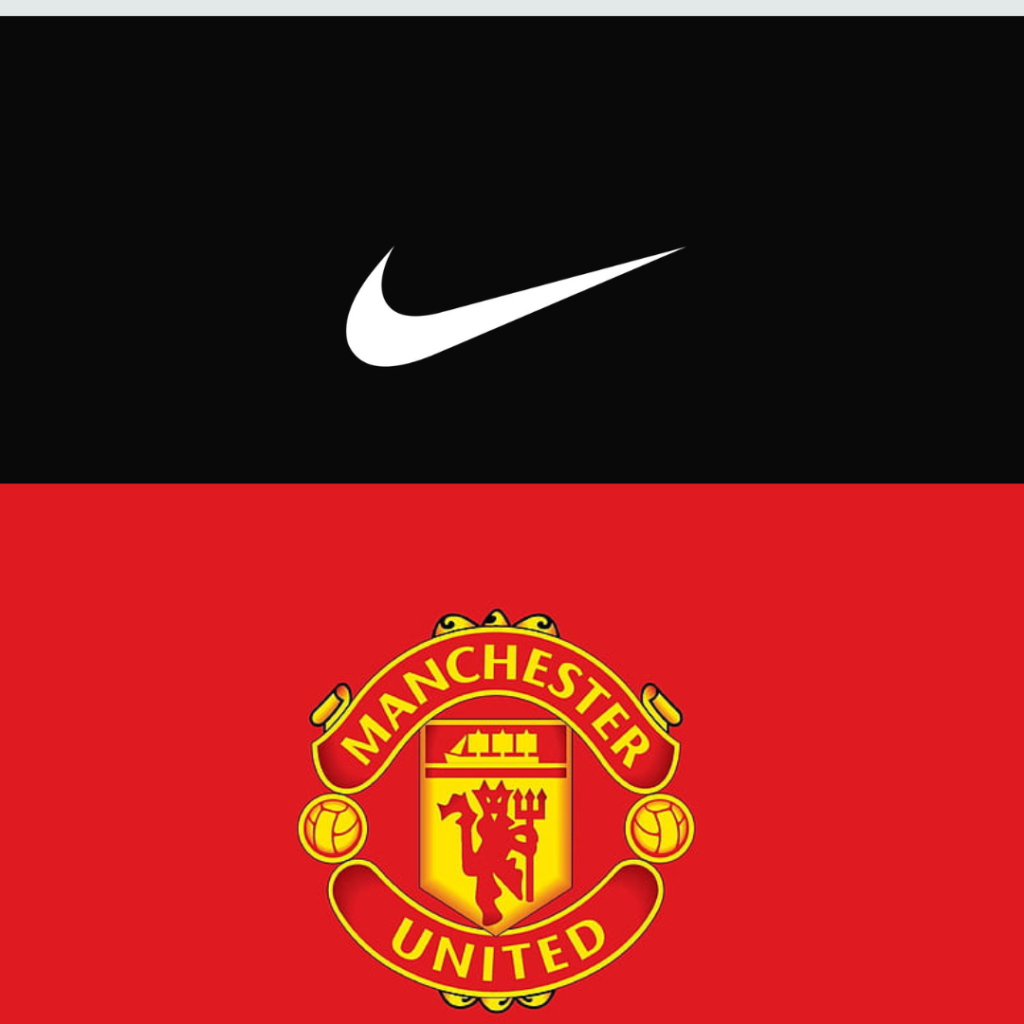A tale of two logos
January 18, 2024
Carlo De Marchis, ‘A guy with the scarf’ looks at this month’s Business Index which has two main stories: Sport Apparel going down, Sport Properties going up.
Let’s focus on two hyper famous logos into those two categories and see if we can find a way to explain what is happening: Nike and Manchester United.
We see 2024 as a year where companies (and boards) will focus on short/mid-term profitability and long term business sustainability, we expect many CEOs to be put to test. And… we may be worng but let’s keep this monthly appointment as a constant check.
Nike
What’s going on?
Nike shares plunge after company slashes revenue outlook
Nike shares took a substantial hit recently, falling over 12% (with Adidas., Puma, Under Armour and others also in negative-land) after the sports apparel powerhouse cut its full-year revenue expectations. The downward revision also dragged down shares of sneaker retailer Foot Locker, which relies heavily on Nike products.
In its recent quarterly earnings report, Nike stunned investors by lowering its annual revenue growth forecast to only 1%, down significantly from its previous projection of mid-single digit expansion. The Oregon-based company also announced plans to cut costs by upwards of $2 billion over the next few years.
Nike attributed its dimmer outlook to escalating headwinds, particularly in Greater China and Europe, Middle East, and Africa (EMEA). The company also cited slowing digital traffic growth and pressure from a strengthening U.S. dollar, which has weakened overseas sales.
“Nike needs improved marketing outside of basketball, streetwear and lifestyle trends,” said analysts at TD Cowen, downgrading Nike’s stock. “Innovation at the higher end of its product range is not resonating at scale while [Nike] faces disruption from smaller competitors in footwear and apparel.”
The famous brand, recognized globally for its iconic Swoosh logo, depends heavily on discretionary spending. But soaring inflation and looming recession fears appear to be forcing consumers to tighten their belts.
In a bid to jumpstart growth, Nike indicated it will recalibrate how it manages its various franchises over their life cycles. But analysts believe this strategic shift could further restrain sales momentum in the coming periods.
Nike’s share price plunge marked its worst single-day performance in recent months. The stock cratering also weighed down Foot Locker shares as investors reacted to the expectation of slackening Nike sneaker sales.
Some Wall Street analysts, however, maintained a favorable outlook on Nike stock over the longer term. Goldman Sachs reiterated its ‘Buy’ rating but noted the results provided “ample fodder for bears.”
Moving forward, Nike’s management team faces an uphill battle demonstrating it can reaccelerate growth despite the challenging macroeconomic environment. Cost-cutting and capital reallocation measures may help shore up profitability. But the market remains skeptical on Nike’s ability to thrive if consumers pull back on spending.
Manchester United
Man United released its first-quarter earnings for the three months ending Sept 30, which reported that revenue increased 9.3% to £157 million ($200 million based on current exchange rates). It was the highest first-quarter earnings in the history of the club, driven by record matchday and commercial revenue—the previous high was £143 million ($182 million) set in 2017.
Here we may suspect what caused the uptick: The Glazer family retained control as INEOS invested in Manchester United.
British billionaire Jim Ratcliffe and his chemical company INEOS have acquired a 25% stake in Manchester United in a complex deal worth around $2 billion. The agreement sees INEOS gain significant influence over the club’s footballing decisions, while the Glazer family retains overall control as 75% owners.
The deal marks the first time under the Glazers’ 17-year ownership that outside investment has been brought into Manchester United. INEOS is contributing $300 million specifically for upgrades to Old Trafford stadium and other infrastructure. This will help address urgent needs, though substantial additional investment will still be required.
As part of the transaction, INEOS officials Sir Dave Brailsford and Jean-Claude Blanc will join the Manchester United board. A three- person committee comprised of Joel Glazer, Ratcliffe, and Brailsford will oversee football matters, essentially giving INEOS veto power on decisions like transfer policy and the manager’s position.
Many Manchester United supporters have long clamored for a complete buyout of the debt-burdened Glazers. While this agreement falls short of that, it does promise much-needed capital infusion along with a shift toward football-first leadership.
Ratcliffe has verbally committed to restoring the club to its former glories, saying “We want a Manchester United anchored in its proud history and roots…clearly focusing on winning the Champions League.” Time will tell whether he can translate those ideals into reality.
In the meantime, the latest cash injection provides manager Erik ten Hag some reassurance that transfer funds will be available to continue rebuilding the squad. After high-profile summer signings disappointed early on, better recruitment will be critical to getting Manchester United back to the summit of English and European football.
This partial sale appears to signal the beginning of the end for the Glazers’ control of Manchester United. But with the family still holding a majority share, frustrated fans eagerly awaiting a full buyout may need to stay patient a while longer.


